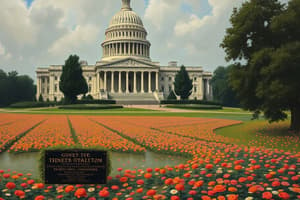Podcast
Questions and Answers
What is a fundamental characteristic of federalism?
What is a fundamental characteristic of federalism?
- A complete centralization of power.
- Uniform governance without regional variations.
- A constitutionally specified division of powers. (correct)
- The absence of a supreme judicial body.
Which of the following best describes identity federalism?
Which of the following best describes identity federalism?
- It leads to the centralization of powers for efficiency.
- It allows distinct communities to participate under a common government. (correct)
- It ignores cultural and linguistic distinctions among communities.
- It is implemented in culturally homogenous nations.
In which scenario is efficiency federalism likely to occur?
In which scenario is efficiency federalism likely to occur?
- In a culturally diverse national community.
- When local governments have no autonomy.
- In a geographically large but culturally homogeneous nation. (correct)
- In a system devoid of national unity.
What role does a supreme judicial body play in a federal system?
What role does a supreme judicial body play in a federal system?
What is a distinguishing feature of the federal system in South Africa?
What is a distinguishing feature of the federal system in South Africa?
Which of the following is NOT a component of a federal system?
Which of the following is NOT a component of a federal system?
How does federalism attempt to reconcile unity and diversity?
How does federalism attempt to reconcile unity and diversity?
Which of the following is a common outcome of federalism?
Which of the following is a common outcome of federalism?
What is one of the primary advantages of federalism?
What is one of the primary advantages of federalism?
Which aspect is generally considered a potential disadvantage of federalism?
Which aspect is generally considered a potential disadvantage of federalism?
What is meant by 'coming together' in the context of federalism?
What is meant by 'coming together' in the context of federalism?
Which of the following best describes the rationale for adopting federalism?
Which of the following best describes the rationale for adopting federalism?
What typically characterizes the distribution of legislative powers in a federal system?
What typically characterizes the distribution of legislative powers in a federal system?
What could be a potential risk associated with federalism?
What could be a potential risk associated with federalism?
How can federalism potentially enhance democracy?
How can federalism potentially enhance democracy?
Which feature is unique to federal systems compared to unitary systems?
Which feature is unique to federal systems compared to unitary systems?
What is one major benefit of federalism in relation to diversity?
What is one major benefit of federalism in relation to diversity?
How does federalism address the issue of scale in governance?
How does federalism address the issue of scale in governance?
What challenge does federalism aim to overcome regarding the relationship between citizens and government?
What challenge does federalism aim to overcome regarding the relationship between citizens and government?
What can be a consequence of increased scale in governance without federalism?
What can be a consequence of increased scale in governance without federalism?
Which of the following statements about federalism is true?
Which of the following statements about federalism is true?
What historically influenced the development of federalism?
What historically influenced the development of federalism?
Which aspect of federalism addresses problems associated with geographic distance between government and people?
Which aspect of federalism addresses problems associated with geographic distance between government and people?
What term is used interchangeably with 'constituent unit'?
What term is used interchangeably with 'constituent unit'?
What is required for federalism to function effectively?
What is required for federalism to function effectively?
How does federalism promote democratic participation?
How does federalism promote democratic participation?
According to the literature, in which context can federalism be a stable and effective form of government?
According to the literature, in which context can federalism be a stable and effective form of government?
What potential benefit does federalism provide to political minorities?
What potential benefit does federalism provide to political minorities?
From whom does the federal government derive its powers as per the new Constitution?
From whom does the federal government derive its powers as per the new Constitution?
What is a key component of a successful federal system?
What is a key component of a successful federal system?
What overlapping authorities do US citizens remain subject to under the Constitution?
What overlapping authorities do US citizens remain subject to under the Constitution?
What may happen to federalism outside of a democratic context?
What may happen to federalism outside of a democratic context?
How can federalism affect women's political participation?
How can federalism affect women's political participation?
Which type of federalism involves previously independent countries uniting into a federal state?
Which type of federalism involves previously independent countries uniting into a federal state?
What characterizes a well-functioning federal system according to the literature?
What characterizes a well-functioning federal system according to the literature?
In the context of federalism, what does the term 'holding together' refer to?
In the context of federalism, what does the term 'holding together' refer to?
What is one reason federalism has spread globally over time?
What is one reason federalism has spread globally over time?
Which of the following is NOT mentioned as a term used to describe the federal level of government?
Which of the following is NOT mentioned as a term used to describe the federal level of government?
Which constituent unit name is NOT associated with federal systems?
Which constituent unit name is NOT associated with federal systems?
What function does federalism serve in countries facing autonomist or secessionist pressures?
What function does federalism serve in countries facing autonomist or secessionist pressures?
What is one advantage of federalism in policy development?
What is one advantage of federalism in policy development?
How does federalism affect the central government's role?
How does federalism affect the central government's role?
What is a potential disadvantage of federalism?
What is a potential disadvantage of federalism?
In what way does federalism promote democratic responsibilities?
In what way does federalism promote democratic responsibilities?
Which of the following is NOT a characteristic of federalism?
Which of the following is NOT a characteristic of federalism?
What effect did Massachusetts's health insurance system have in the context of federalism?
What effect did Massachusetts's health insurance system have in the context of federalism?
What role does resource sharing play in federalism?
What role does resource sharing play in federalism?
How can federalism influence economic and social development?
How can federalism influence economic and social development?
Flashcards
Federalism
Federalism
A system of government where power is divided between a national government and smaller regional governments (like states or provinces).
Advantages of Federalism
Advantages of Federalism
Potential benefits of a federal system, such as reduced conflict between different groups, enhanced local autonomy, and improved responsiveness to local needs.
Disadvantages of Federalism
Disadvantages of Federalism
Possible negative aspects of a federal system, such as potential conflicts arising from differences in regional interests, and possible inefficiencies from a separation of powers.
Distribution of Legislative Powers
Distribution of Legislative Powers
Signup and view all the flashcards
Distribution of Executive Powers
Distribution of Executive Powers
Signup and view all the flashcards
Rationale for Federalism
Rationale for Federalism
Signup and view all the flashcards
Coming Together/Holding Together
Coming Together/Holding Together
Signup and view all the flashcards
Potential Advantages of Federalism
Potential Advantages of Federalism
Signup and view all the flashcards
Levels of Government in Federalism
Levels of Government in Federalism
Signup and view all the flashcards
Identity Federalism
Identity Federalism
Signup and view all the flashcards
Efficiency Federalism
Efficiency Federalism
Signup and view all the flashcards
Constitutional division of powers
Constitutional division of powers
Signup and view all the flashcards
Rigid Constitution
Rigid Constitution
Signup and view all the flashcards
Supreme Judicial Body
Supreme Judicial Body
Signup and view all the flashcards
Identity and Efficiency in Federalism
Identity and Efficiency in Federalism
Signup and view all the flashcards
US Federalism: Roots
US Federalism: Roots
Signup and view all the flashcards
Dual Authority
Dual Authority
Signup and view all the flashcards
Federal System Spread
Federal System Spread
Signup and view all the flashcards
Holding Together Federalism
Holding Together Federalism
Signup and view all the flashcards
Coming Together Federalism
Coming Together Federalism
Signup and view all the flashcards
Federal System Terminology
Federal System Terminology
Signup and view all the flashcards
Federalism as Decentralization
Federalism as Decentralization
Signup and view all the flashcards
Federalism as a Tool for Unity
Federalism as a Tool for Unity
Signup and view all the flashcards
Federalism and Scale
Federalism and Scale
Signup and view all the flashcards
Federalism and Diversity
Federalism and Diversity
Signup and view all the flashcards
How does federalism address scale?
How does federalism address scale?
Signup and view all the flashcards
How does federalism address diversity?
How does federalism address diversity?
Signup and view all the flashcards
What are the origins of democracy?
What are the origins of democracy?
Signup and view all the flashcards
Why was democracy initially limited to small states?
Why was democracy initially limited to small states?
Signup and view all the flashcards
What does 'representative institutions' mean?
What does 'representative institutions' mean?
Signup and view all the flashcards
What's the challenge with a large political unit?
What's the challenge with a large political unit?
Signup and view all the flashcards
Power-Sharing in Federalism
Power-Sharing in Federalism
Signup and view all the flashcards
Constitutionalism & Pluralism in Federalism
Constitutionalism & Pluralism in Federalism
Signup and view all the flashcards
Federalism and Democracy
Federalism and Democracy
Signup and view all the flashcards
Benefits of Power-Sharing
Benefits of Power-Sharing
Signup and view all the flashcards
Federalism and Political Influence
Federalism and Political Influence
Signup and view all the flashcards
Subnational Units
Subnational Units
Signup and view all the flashcards
Federalism and National Identity
Federalism and National Identity
Signup and view all the flashcards
The Term 'Subnational'
The Term 'Subnational'
Signup and view all the flashcards
Policy Innovation in Federalism
Policy Innovation in Federalism
Signup and view all the flashcards
Reduced Central Burden
Reduced Central Burden
Signup and view all the flashcards
Resource Distribution in Federalism
Resource Distribution in Federalism
Signup and view all the flashcards
Developing Political Capacity
Developing Political Capacity
Signup and view all the flashcards
Duplication in Federalism
Duplication in Federalism
Signup and view all the flashcards
Policy Coherence in Federalism
Policy Coherence in Federalism
Signup and view all the flashcards
Study Notes
Introduction
- Federalism is a constitutional system dividing power between different levels of government.
- Federated units have guaranteed autonomy in specific policy areas.
- Power is shared in other areas according to agreed rules.
- Federalism combines partial self-government with partial shared government.
- Often associated with large, culturally diverse countries.
- Examples include: Argentina, Belgium, Brazil, Canada, Germany, India, Malaysia, Nigeria, Pakistan, Spain, South Africa, and the United States.
- This system aims for peace, stability, and accommodation in diverse countries.
- It can improve service delivery, democratic resilience, and prevent over-concentration of power.
What is the Issue?
- Federalism establishes a constitutionally defined division of power between different levels of government (national/federal and regional/state, often with local governments too)
- Distinguishes between distinct communities with separate powers.
- A constitution dictates distribution of power and responsibilities.
- Involves legislative, executive (and sometimes judicial) institutions at each level.
- A supreme judicial body settles disputes between levels of government.
- Two contexts for understanding federalism:
- Identity federalism: Where distinct communities choose to live together due to shared interests, but also maintaining their own unique needs and demands.
- Efficiency federalism: Where a large nation seeks local governance to improve democratic representation and accountability.
Advantages and Disadvantages of Federalism
Rationale for Federalism
- Federalism is an institutional method to handle issues of scale and diversity.
- Small states often started democracies, through direct participation.
- Large nations needed representative institutions, but also faced issues of scale, where a distance between the government and the people widened, meaning it was harder for citizens to influence the political process.
- Federalism helps to address these issues by enabling regional power and participation. This allows governments to tailor policies to specific local needs.
- It maintains diversity and allows for community and identity recognition - preventing secessionist pressures.
Diversity
- Federalism allows for recognition of different ethnic, religious, and cultural groups.
- It facilitates recognizing communities' desires to be recognized as a distinct people with their unique identities and interests.
- Appropriate for countries with concentrated communities with unique identities.
Other Potential Advantages
- Federal government is grounded in constitutionalism and pluralism.
- Power-sharing among different levels avoids one level from being all-powerful.
- Encourages discussion and negotiation between balanced centres of power. (Recognizing minority positions)
- It allows political minorities to gain influence at subnational levels, supporting political inclusion.
- Allows for innovation and experimentation in policymaking. Subnational units can pilot new policies that may or may not be adopted nationally.
- Reduces the burden on central authorities enabling them to address strategic issues.
- Resources are shared across geographical areas.
- Provides a training and development context for public officials.
Potential Disadvantages
- Duplication of government functions can lead to overlapping/contradictory policies.
- Complexity involved may hinder clarity of responsibilities and policy outcomes.
- Can be more expensive to run multiple levels of government.
- Regional discrepancies in wealth and outcomes could arise in the absence of specific revenue agreements.
- Increased likelihood of judicial decisions required to resolve disputes between levels of governance.
- Potential exclusion of minorities in certain contexts, where minority power is based on subnational structures
- 'Race to the bottom': Competition to lower wages and costs to attract capital, undermining the power of democratic government.
- Ineffectual governance: Decentralized governance may fail due to a lack of capacity in subnational units and/or insufficient resources.
- Instability: Potential for instability if not managed effectively: Federalism may create additional risks of conflict, or serve as a platform for separatist/secessionist demands. This may destabilize the democracy.
Increasing Regional Discrepancies
- Regional disparities in wealth and resources could arise without revenue-sharing systems.
- Differences in service provision and quality is possible.
Harmful Economic Competition
- Smaller regulatory units could lead to a dangerous "race to the bottom", in which states compete to lower costs and wages.
- This could create significant challenges to economic and social progress
Judicialization of Politics
- Increased role for the judiciary in disputes between levels of government, because of strict separation of powers.
Potential Exclusion of Minorities
- While federalism provides autonomy and recognition for some minorities, it can potentially exclude certain minorities.
- Where areas are established on ethnic, linguistic or religious lines this could mean other minorities could suffer oppression.
- The importance of strong central government to counteract potential marginalisation of minorities.
Strengthening of Local Elites
- Potential for misuse of subnational governments by powerful groups to gain profit at the expense of the general good.
- Corruption is especially difficult to eradicate in smaller administrative areas.
Ineffective Governance
- Subnational governance can fail to deliver on its promises due to lack of human and financial resources.
Instability and Threats to Democracy
- Multiple levels of power could lead to added instability, especially if federalism is introduced into a pre-consolidated democracy.
Studying That Suits You
Use AI to generate personalized quizzes and flashcards to suit your learning preferences.





